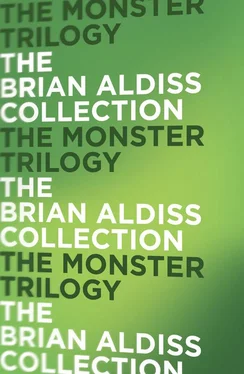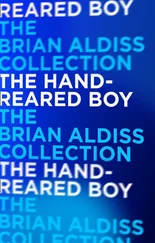1 ...8 9 10 12 13 14 ...32 ‘Could we get the stuff back if we ever wanted to?’ someone asked. ‘I mean, if future ages found what we consider waste to be valuable, worth reclamation.’
‘Sure. Just as I have been brought back to the present time. The point to remember is that at the moment the technology requires enormous amounts of energy. It’s expensive, but security costs. You know we at Bodenland Enterprises are presently tapping solar energy, beamed down from our own satellite by microwave. If and when we get the okay from the DoE, we can afford to research still more efficient methods of beaming in power from space.’
The two men from the Post had been conferring. The senior man said, ‘We certainly appreciate the Edison imitation, Mr Bodenland. But aren’t you being unduly modest – haven’t you just invented the world’s first time machine? Aren’t you applying to the wrong department? Shouldn’t you be approaching the Defence top brass in the Pentagon?’
Laughter followed the question, but Bodenland looked annoyed. ‘I’m against nuclear weapons and, for that matter, I’m enough of a confirmed Green to dislike nuclear power plants. Hence our research into PBSs – power-beam sats. Solar energy, after many decades, is coming into its own at last. It will replace nuclear power in another quarter century, if I have anything to do with it.
‘However, to answer your question – as I have often answered it before – no, I emphatically reject the idea that the inertial principle has anything to do with time travel, at least as we understand time travel since the days of H. G. Wells.
‘What we have here is a form of time-stoppage. Anything – obviously not just toxic wastes – can be processed to stay right where it is, bang on today’s time and date, for ever, while the rest of us continue subject to the clock. That applies even to the DoE.’
As the last media man scooped up a handful of salted almonds and left, Mina turned to Bodenland.
‘You are out of your mind, Joe. Taking unnecessary risks again. You might have been killed.’
‘Come on, it worked on mice.’
‘You should have tried rats.’
He laughed.
‘Birdie, I had an idea while I was in limbo. Something Kylie said stuck in my mind – that the ghost train and the discovery of Bernie Clift’s grave were somehow connected. Suppose it’s a time connection … That train, or whatever it is, must have physical substance. It’s not a ghost. It must obey physical laws, like everything else in the universe. Maybe the connection is a time connection. If we used the inertial principle in a portable form – rigged it up so that it would work from a helicopter —’
‘Oh, shucks!’ she cried, seeing what was in his mind. ‘No, no more funnies, please. You wouldn’t want to be aboard that thing even if you could get in. It’s packed with zombies going God knows where. Joe, I won’t let you.’
He put his hands soothingly on her shoulders. ‘Mina, listen —’
‘How many years have I listened? To what effect? To more stress and strain, to more of your bullshit?’
‘I have to get on that train. I’m sure it could be done. It’s no worse than your sky-diving. Leap into the unknown – that’s what we’re all about, darling.’
‘Oh, shit,’ she said.
At some time in the past, the cell had been whitewashed in the interests of cleanliness. It was now filthy. Straw, dust, pages of old newspaper, a lump of human ordure, littered the stone-paved floor.
A mouse ran full tilt along one of the walls. Its coat was grey, with longer russet hair over the shoulders. It moved with perfect grace, its small beady eyes fixed on the madman ahead, and more particularly on his open mouth.
Strapped within a straitjacket, the lunatic lay horizontal on the floor. The straitjacket was of canvas, with leather straps securing it, imprisoning the arms of the madman.
He had kicked his semen-stained grey mattress into a corner, to lie stretched out on the stones, his head wedged in another corner.
He was motionless. His eyes gleamed as he kept his gaze on the mouse, never blinking. His chops gaped wide, his tongue curled back. Saliva dripped slowly to the ground.
The mouse had been foraging in one of the holes in the old mattress when the madman fixed it with his gaze. The mouse had remained still, staring back, as if undergoing some internal struggle. Then its limbs had started to twitch and move. It had slewed round, squealing pitifully. Then it began its run towards the open jaws.
There was no holding back. It was committed. Scuttling along with one flank close to the wall, it ran towards the waiting face. With a final leap, it was in the mouth. The madman’s jaws snapped shut.
His eyes bulged. He lay still, body without movement. Only his jaws moved as he chewed. A little blood leaked from his lips to the floor.
With much cracking of tiny bones, he finished his mouthful. Then he licked the pool of blood from the stained stones.
Outside the cell stretched a long corridor, a model of cleanliness compared with the cell in which the madman was imprisoned. At the other end of the corridor, Doctor Kindness had his office, which connected with a small operating room.
The office was furnished with phrenological and anatomical charts. On one of the wood-panelled walls hung a day-to-day calendar for the current year, 1896, with quotations from Carlyle, Martin Tupper, Samuel Smiles, and other notables.
The furniture was heavy. Two armchairs were built like small fortresses, their soiled green leather bulging with horsehair, their mahogany shod with brass studs.
A general air of heaviness, of a place where, in the interests of medicine, oxygen was not allowed to enter, hung about the room. In the black lead grate, a coal fire had died, in despair at the retreat of the last of the oxygen. Only the black meerschaum pipe of the doctor glowed, sucking oxygen from the lungs of this pillar of the asylum. Clouds of smoke ascended from the bowl of the pipe to the ceiling, to hang about the gas brackets looking for release.
In order to make the room less inviting, a row of death masks stood on the heavy marble mantelshelf above the dead fire. The masks depicted various degrees of agony, and were of men and women who, judging by this plaster evidence involuntarily left behind, had found life with all its terrors preferable to what was imminently to come.
The doctor was perfectly at home in this environment. As he sauntered through, smoking, from the operating room, he set a blood-stained bone-saw down among the papers of his desk before turning to his visitor.
Dr Kindness was pale and furrowed, and enveloped almost entirely in a blood-stained white coat. In his prevailing greyness, his only vigorous signs of life were exhibited through his pipe.
His visitor was altogether of a different stamp. His most conspicuous characteristic was a bushy red beard, which flowed low enough over the lapels of a suit of heavy green tweed to make it impossible to tell if he was wearing a tie. He was of outdoor appearance, solid, and with a normally pleasant expression on his broad face. At this moment, what with the smoke and the bone-saw and the oppressive atmosphere of the asylum, he looked more apprehensive than anything else.
‘Well, it’s done,’ said Dr Kindness, removing the pipe for a moment. ‘If you’d like to come and have a look. It’s not a pretty sight.’
‘Sure, sure, I’d be glad …’ But the ginger man rose from his armchair by the dead fire with reluctance, and was aided into the operating room only by Dr Kindness’s pressure behind him.
The reason for Dr Kindness’s heavy generation of smoke-screen was now apparent. The stench in the operating room was pervasive. To breathe it caused an agitation in the heart.
Читать дальше












